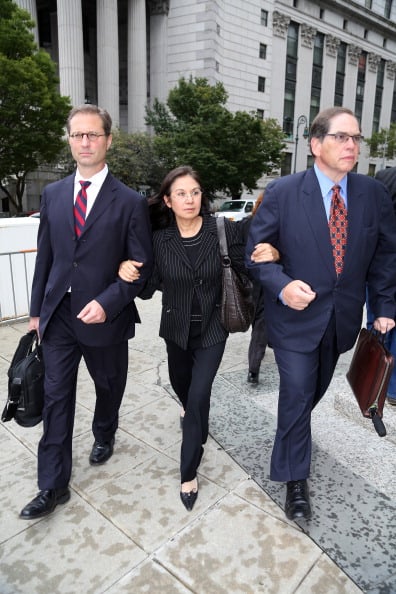
Glafira Rosales, the disgraced Long Island art dealer who is currently the sole person detained in the massive Knoedler forgery case, was ordered by a federal judge to pay $81 million to victims of the fraud, according to an order filed July 5.
The restitution order, filed in US District Court, Southern District of New York, comes four months after Rosales was sentenced to nine months of house arrest and three years probation for her part in the fraud. In 2013, Rosales entered a guilty plea to charges of wire fraud, money laundering, and tax evasion. She previously served three months in jail.
Rosales used her car to transport paintings to Knoedler and other galleries. She and other gallery staffers claimed the paintings were masterpieces by the likes of Jackson Pollock, Mark Rothko, and Robert Motherwell that had been kept for decades in a secret international collection maintained by a mystery man called “Mr. X.” Dozens of the paintings were sold to unwitting buyers—including many sophisticated collectors—for tens of millions of dollars between the years of 1994 and 2009.
The Knoedler gallery shuttered in 2011, and many of the civil suits filed over the scheme have since been settled out of court.
“Glafira has taken responsibility for her role in the situation and regrets any harm that people have suffered,” her attorney Bryan C. Skarlatos told artnet News via email.
Explaining the timing of the restitution order, a spokeswoman for the US Attorney’s office told artnet News the office had asked for additional time after Rosales’s sentencing because it was trying to get more accurate information on the losses. In a statement filed on April 27, acting US Attorney Joon Kim and assistant US attorney Patrick Egan wrote that the government “has been working to identify all of the victims in this fraud that dates back to 1994… The process has proven more complicated than originally anticipated.”
The names, addresses, and specific amounts owed to the victims were outlined in an attached document, but it has been sealed “to protect the privacy interests of victims,” according to the order.
Art dealer Jose Carlos Bergantinos Diaz and his brother were arrested in Southern Spain and charged in connection with the Knoedler forgery scandal. U.S. prosecutors sought their extradition to the U.S.
Also named in the 2014 indictment are Rosales’s former partner Jose Carlos Bergantiños Diaz and his brother Jesus Bergantiños Diaz, as well as Chinese painter Pei-Shen Qian who created the fakes. Qian fled to China and Jose Carlos and his brother moved to Spain. An extradition order for both brothers was granted in early 2016, but a month later, Jose Carlos convinced a Spanish judge that his health was too fragile for him to travel to the United States. His brother Jesus’s whereabouts are unknown.
Shortly before sentencing, Rosales’s attorney Skarlatos released a lengthy statement outlining years of abuse Rosales allegedly suffered at the hands of long-time partner Bergantiños Diaz with whom she has a daughter. The statement claims that Rosales was in constant fear that Bergantiños Diaz threatened he would take their daughter away from her and leave for Spain. The statement also claims that Bergantiños used threats to force Rosales to keep up the fraudulent scheme for more than a decade and a half.
In deciding Rosales’s sentence, Judge Katherine Polk Failla said she weighed Rosales’s testimony heavily and noted that Rosales had cooperated with the authorities after her arrest.